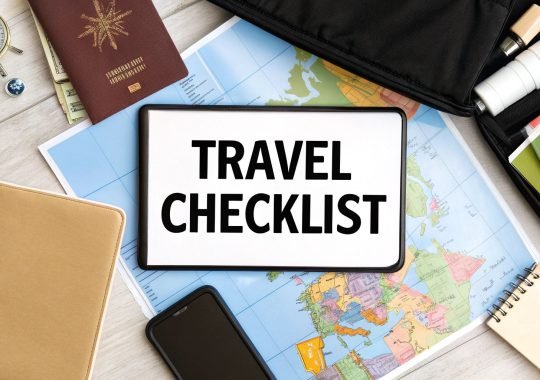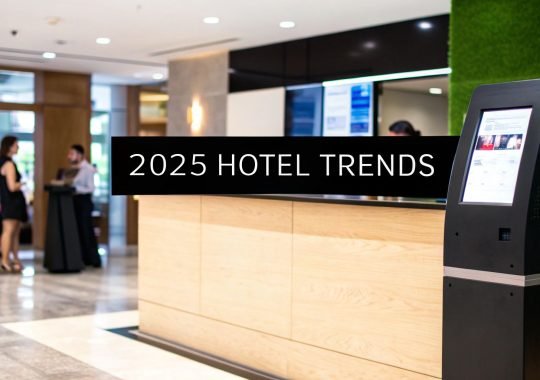In a world saturated with travel options, a single booking can make or break your trip. The difference between a dream vacation and a travel nightmare often comes down to the quality of your information. With countless voices online, how do you filter the noise and find credible advice? The sheer volume of reviews can be overwhelming, and not all platforms are created equal. Some prioritize verified guest feedback, while others rely on anonymous professional inspectors. Choosing the wrong source can lead to a hotel that looks nothing like its pictures or has service that falls far short of expectations.
This guide is designed to solve that problem by cutting through the clutter. We offer a deep dive into the 12 best hotel review sites, moving beyond simple star ratings to analyze the hidden mechanics of each platform. You’ll learn which sites are best for luxury travel, which excel at budget-friendly options, and which provide the most reliable, unbiased feedback. Our comprehensive analysis examines the nuances of each system, from verified-only reviews on Booking.com to the meticulous, incognito inspections conducted by Forbes Travel Guide.
Prepare to learn not just where to look, but how to look. Each entry in our list includes a detailed breakdown of its unique features, pros and cons, and practical tips for maximizing its potential. With screenshots for visual context and direct links for easy access, you’ll gain the tools to make an informed and confident hotel choice. This is your first step to ensuring your next getaway is perfectly suited to your needs.
1. Tripadvisor
Tripadvisor stands as a titan in the travel industry, often considered the starting point for anyone planning a trip. Its sheer scale is its primary differentiator; with over a billion user-generated reviews, it provides an unparalleled volume of feedback on nearly any hotel imaginable. This extensive database makes it one of the best hotel review sites for gauging overall public sentiment and finding candid traveler photos that often paint a more realistic picture than professional marketing shots.
The platform is more than just a review aggregator. It integrates booking functionalities, allowing you to compare prices from various online travel agencies (OTAs) and book directly. Its interface is relatively intuitive, though the sheer amount of information can sometimes feel overwhelming to new users.
Navigating the Platform Effectively
To get the most value, leverage its powerful filtering system. You can sort reviews by traveler type (e.g., families, couples, business), time of year, and rating. This helps you find feedback most relevant to your specific travel context. For instance, a business traveler’s needs differ greatly from a family on vacation.
Pro Tip: Pay close attention to the dates of reviews. A hotel’s management, cleanliness, and service can change quickly. Prioritize reviews from the last 6-12 months for the most accurate and current assessment of a property.
Pros and Cons
- Pros:
- Massive Review Volume: The huge number of reviews provides a balanced, crowd-sourced perspective that is difficult for a single biased opinion to skew.
- Traveler Photos: User-submitted photos offer an unfiltered look at rooms, amenities, and property conditions.
- Comprehensive Scope: Covers hotels, restaurants, and attractions, making it a one-stop-shop for trip planning.
- Cons:
- Unverified Reviews: The open nature of the platform means some reviews may be unverified, leading to potential concerns about authenticity and fake or biased feedback.
- Information Overload: The vast amount of content can be difficult to sift through without using the filters strategically.
Website: https://www.tripadvisor.com
2. Booking.com
Booking.com has evolved from a pure booking engine into a powerhouse for travel research, largely thanks to its massive and highly credible review system. Its key differentiator is that only guests who have completed a stay can leave a review, effectively eliminating fake or malicious feedback. With over 250 million verified reviews, it is one of the best hotel review sites for travelers who prioritize authenticity and reliability above all else.
The platform seamlessly integrates these reviews into its booking interface, making it easy to see real-world feedback while comparing prices and availability. The user experience is clean and direct, focusing on providing all necessary information, from professional photos to candid guest scores, in one streamlined view.
Navigating the Platform Effectively
Beyond the overall score, pay close attention to the categorized ratings. Booking.com breaks down reviews into specific areas like staff, facilities, cleanliness, comfort, value for money, and location. This allows you to quickly identify a property’s specific strengths and weaknesses, helping you match a hotel to your personal priorities. A high location score is great for sightseers, while a top cleanliness score might be more important for others.
Pro Tip: Use the “Sort by” filter and select “Date of review and rating” to see the most recent high-scoring reviews first. This gives you a current snapshot of the guest experience while still prioritizing quality feedback.
Pros and Cons
- Pros:
- Verified Reviews Only: Its greatest strength is the high credibility, as only confirmed guests can submit feedback, ensuring authenticity.
- Categorized Scoring: The detailed breakdown of scores (cleanliness, staff, etc.) offers specific insights into a hotel’s performance.
- Integrated Booking: You can read reviews and book your stay in a single, efficient process.
- Cons:
- Limited Scope: Reviews are confined to properties listed on Booking.com, so you won’t find feedback on some smaller boutique or independent hotels.
- Booking-Centric: The platform’s primary goal is to secure a booking, so the review experience is intrinsically tied to the sales process.
Website: https://www.booking.com
3. Google Reviews
Google Reviews leverages the unparalleled reach of its parent company, seamlessly integrating user feedback directly into Google Search and Google Maps. Its primary strength lies in its accessibility; when you search for a hotel, star ratings and review snippets appear instantly, eliminating the need to visit a separate website. This makes it one of the best hotel review sites for quick, at-a-glance assessments during the initial stages of travel planning.
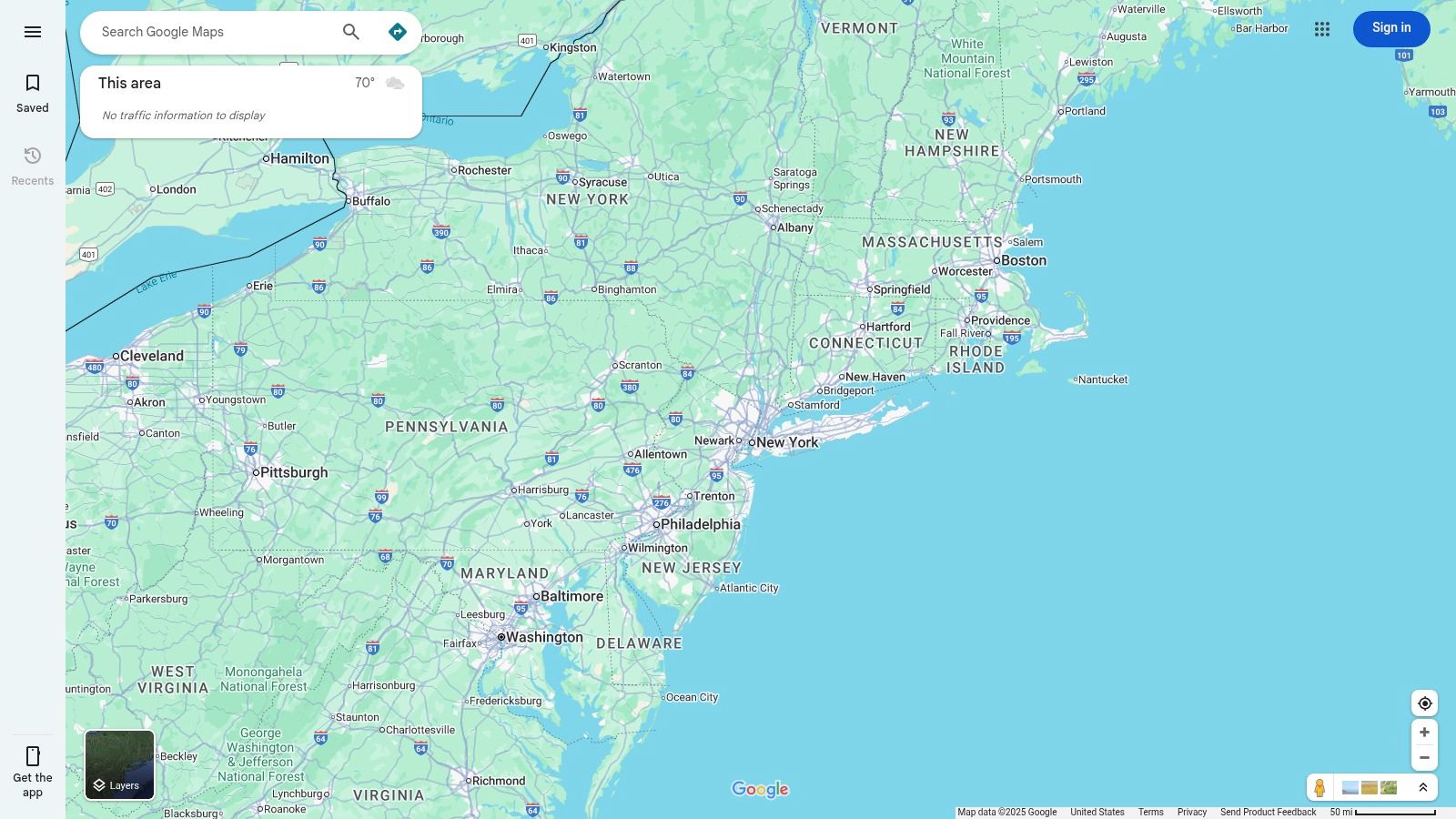
The platform often aggregates reviews from other travel sites, providing a more holistic score alongside its native user feedback. This integration provides a convenient, centralized hub for information, though it presents less depth than a dedicated review platform. Public responses from hotel management are also clearly visible, offering insight into their customer service approach.
Navigating the Platform Effectively
When using Google Maps to find hotels, click on a property to open its detailed information panel. From there, select the “Reviews” tab. Here, you can search for specific keywords within the reviews, such as “air conditioning,” “breakfast,” or “parking,” to quickly find feedback on the amenities that matter most to you.
Pro Tip: Look for hotels that actively respond to both positive and negative reviews. A thoughtful, professional response to criticism is often a strong indicator of a management team that cares about guest experience and is proactive about solving problems.
Pros and Cons
- Pros:
- Seamless Integration: Reviews are built directly into Google Search and Maps, making them incredibly convenient and easy to find.
- High Visibility and Accessibility: No need to create a new account or navigate a separate platform; the information is readily available to billions of users.
- Aggregated Scores: Often includes review data from other platforms, offering a broader perspective on a hotel’s reputation.
- Cons:
- Limited Filtering: The filtering options are less sophisticated than dedicated sites, making it harder to sort reviews by specific traveler types.
- Potential for Unverified Reviews: The open system allows anyone with a Google account to leave a review, which can raise questions about authenticity.
Website: https://www.google.com/maps
4. Expedia
Expedia functions as a powerhouse online travel agency (OTA), but its robust review system makes it a strong contender among the best hotel review sites. Its key advantage lies in the verification process; only customers who have booked and completed a stay through Expedia can leave a review. This closed-loop system significantly increases the credibility and reliability of the feedback, virtually eliminating the risk of fake or competitor-driven reviews.
Beyond its review system, Expedia’s core strength is its all-in-one booking capability. It seamlessly integrates hotel searches with flights, car rentals, and activities, often encouraging users to bundle these services for significant savings. The platform’s interface is clean and user-friendly, making it easy to compare properties and manage entire trip itineraries in one place.
Navigating the Platform Effectively
To maximize your search, use the “Sort by” filter and select “Guest rating” to see the highest-rated properties first. You can also filter reviews by traveler type, such as family or business, to find feedback that aligns with your travel needs. Look for listings labeled with “Member Price” for exclusive discounts available to Expedia Rewards members.
Pro Tip: When booking, pay attention to the “package deal” options. Bundling your hotel with a flight or car rental can often unlock steeper discounts on the accommodation portion than booking it standalone, providing excellent value.
Pros and Cons
- Pros:
- Verified Reviews: All reviews are from guests who have actually stayed at the property, ensuring a high degree of authenticity.
- Comprehensive Travel Services: A one-stop-shop for booking flights, cars, and activities alongside your hotel.
- Bundle and Save: Offers significant financial incentives for bundling multiple travel components together.
- Cons:
- Limited Scope: Reviews are exclusive to properties bookable on Expedia, so you won’t find feedback on all hotels.
- Pricing Discrepancies: While rare, some users report that final prices at checkout can sometimes differ from initial search results.
Website: https://www.expedia.com
5. Hotels.com
Hotels.com operates as a major online booking platform where the review system is directly tied to its ecosystem. Its key differentiator is the combination of verified guest reviews with a compelling loyalty program, making it one of the best hotel review sites for travelers who value tangible rewards for their loyalty. Since reviews can only be left by guests who have completed a booking through the site, the feedback carries a high degree of authenticity.
The platform is renowned for its straightforward, user-friendly interface that integrates comprehensive property descriptions, professional photos, and guest feedback seamlessly. This makes comparing options and making an informed booking decision a relatively smooth process for most users.
Navigating the Platform Effectively
The standout feature is the Hotels.com Rewards program. For every 10 nights you book and stay, you earn one reward night. To maximize this benefit, be consistent with your bookings on the platform. The value of your reward night is the average price of the 10 nights you collected, so booking a mix of budget and premium stays can yield significant value. To get even more from your accommodation budget, you can explore various budget travel tips.
Pro Tip: When reading reviews, use the detailed filters to sort by what matters most to you, such as “Family friendly” or “Excellent breakfast.” This helps you cut through the noise and focus on properties that have been highly rated for the specific amenities you need.
Pros and Cons
- Pros:
- Verified Reviews: All reviews come from customers who have actually stayed at the property, increasing their reliability.
- Excellent Rewards Program: The “collect 10 nights, get 1 free” loyalty program adds tangible value, especially for frequent travelers.
- User-Friendly Interface: The site is clean and easy to navigate, with powerful filtering options that simplify the search process.
- Cons:
- Closed Ecosystem: It primarily lists properties available within its booking system, which means some smaller, independent, or boutique hotels may be absent.
- Price-Focused Reviews: Reviews can sometimes be heavily influenced by the price paid, which may not reflect the overall quality of the stay.
Website: https://www.hotels.com
6. Yelp
While primarily known for restaurant and local service reviews, Yelp has carved out a significant niche in the travel space, especially for hotels in North America. Its strength lies in its deeply engaged, community-driven user base, which provides candid and often highly detailed reviews. For travelers looking for feedback with a strong local flavor, Yelp can be one of the best hotel review sites to consult.
The platform’s distinctive feature is its focus on the overall local experience, not just the hotel room itself. Reviews often include tips on nearby attractions, dining, and neighborhood safety, giving you a holistic view of your potential stay. Its user-submitted photos are also a key asset, frequently showcasing the small details and genuine condition of a property that professional shots might miss.
Navigating the Platform Effectively
Yelp’s “Elite Squad” reviews are a goldmine. These are written by the platform’s most active and trusted contributors, and their feedback is typically more thorough and reliable. You can filter for these reviews to get a high-quality assessment quickly. Also, use the platform’s Q&A feature to ask specific questions about a hotel, as the community and business owners are often quick to respond.
Pro Tip: Look for patterns in the “Not Recommended” reviews section at the bottom of a business page. While filtered out by Yelp’s algorithm, these can sometimes reveal recurring issues that might be important for your decision, such as consistent noise complaints or service problems.
Pros and Cons
- Pros:
- Authentic Community Vibe: The reviews often feel more personal and less transactional than on sites purely dedicated to travel.
- Detailed Local Context: Excellent for understanding the neighborhood and local businesses surrounding a hotel.
- Strong Photo Libraries: A wealth of user-uploaded photos provides a real-world glimpse into the property.
- Cons:
- Geographic Limitations: Coverage is heavily concentrated in North America; it can be less useful for international travel outside of major cities.
- Unverified Stays: Like many open platforms, Yelp does not always verify that a reviewer actually stayed at the hotel, leaving room for potential bias.
Website: https://www.yelp.com
7. Agoda
Agoda has carved out a significant niche as a dominant online travel agency, particularly for travelers exploring the Asia-Pacific region. Its primary strength lies in its extensive inventory of accommodations in this part of the world, often featuring properties not listed on other major platforms. All reviews on Agoda are from verified guests, which adds a crucial layer of trust and authenticity to the feedback provided.
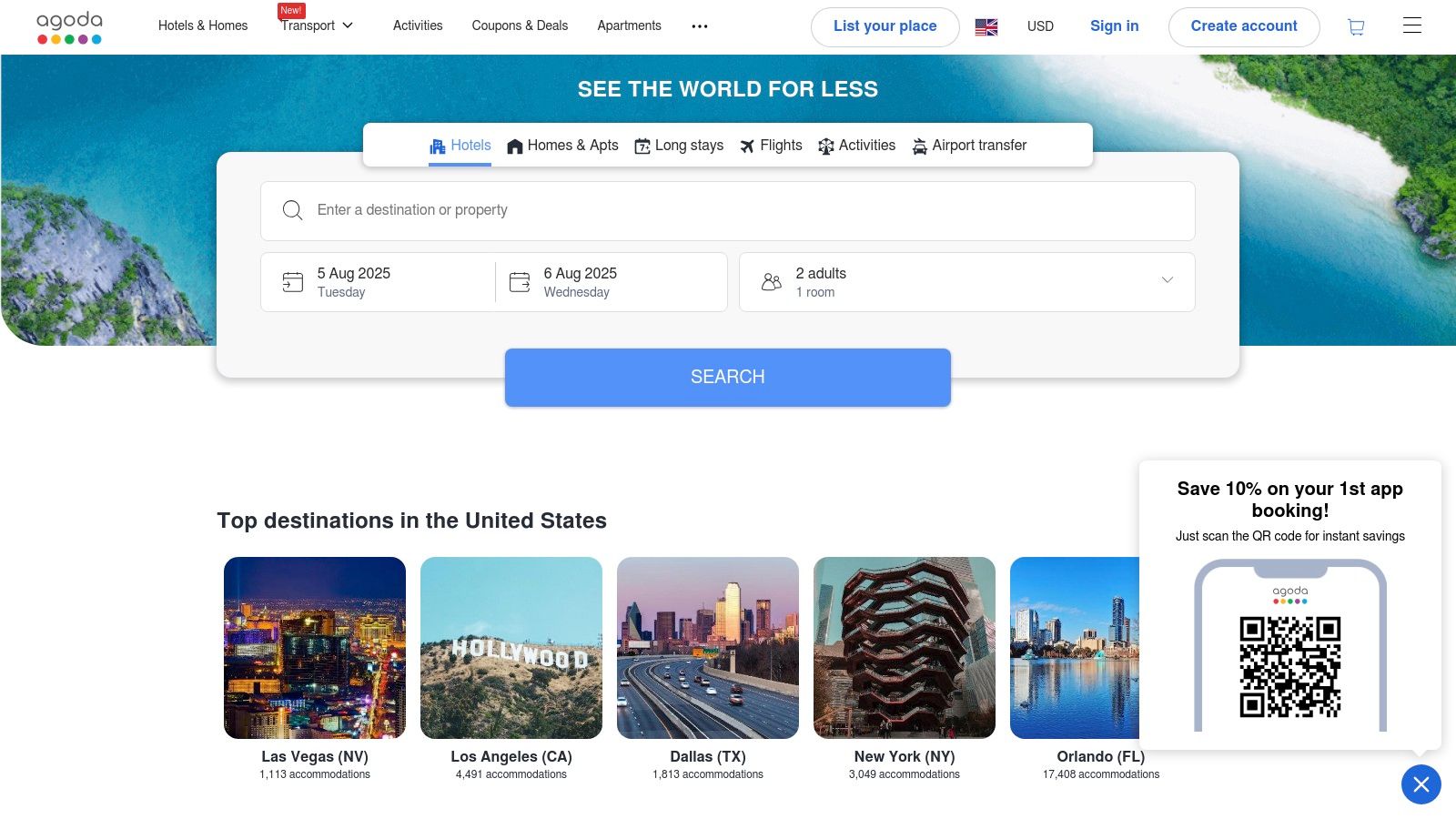
The platform is renowned for its competitive pricing and frequent promotions, making it a go-to for budget-conscious travelers. The user interface is clean and mobile-friendly, with an app that often provides exclusive, deeper discounts on stays. This makes it one of the best hotel review sites for those seeking value, especially in Asian markets.
Navigating the Platform Effectively
To maximize savings, always check both the website and the mobile app, as “app-only” deals can offer significant discounts. Use the detailed filters to sort by not just price and rating, but also by specific amenities or neighborhood, which is particularly useful in large, unfamiliar cities. Pay close attention to the detailed room-type comparisons, as Agoda excels at clearly laying out the differences in size, views, and included perks.
Pro Tip: Look for “AgodaCash” or other loyalty rewards. Frequent users can accumulate credits that can be applied to future bookings, effectively lowering the cost of subsequent trips.
Pros and Cons
- Pros:
- Extensive Asia-Pacific Coverage: Unparalleled selection of hotels, guesthouses, and apartments throughout Asia.
- Verified Reviews Only: All reviews are from guests who have completed a stay booked through the platform, ensuring authenticity.
- Competitive Pricing: Often features aggressive pricing, secret deals, and mobile-exclusive offers.
- Cons:
- Booking-System Focus: Reviews are limited to properties available for booking on Agoda, which may exclude some smaller or independent hotels.
- Customer Service Reports: Some users have reported inconsistencies with customer service responsiveness, particularly with complex booking changes.
Website: https://www.agoda.com
8. Trivago
Trivago operates not as a direct review host, but as a powerful hotel metasearch engine. Its primary function is to aggregate hotel listings, prices, and review scores from hundreds of booking sites, including Expedia, Booking.com, and Hotels.com. This makes it one of the best hotel review sites for travelers focused on efficiency, allowing you to see a broad market overview in a single search and find the lowest price for a specific hotel.
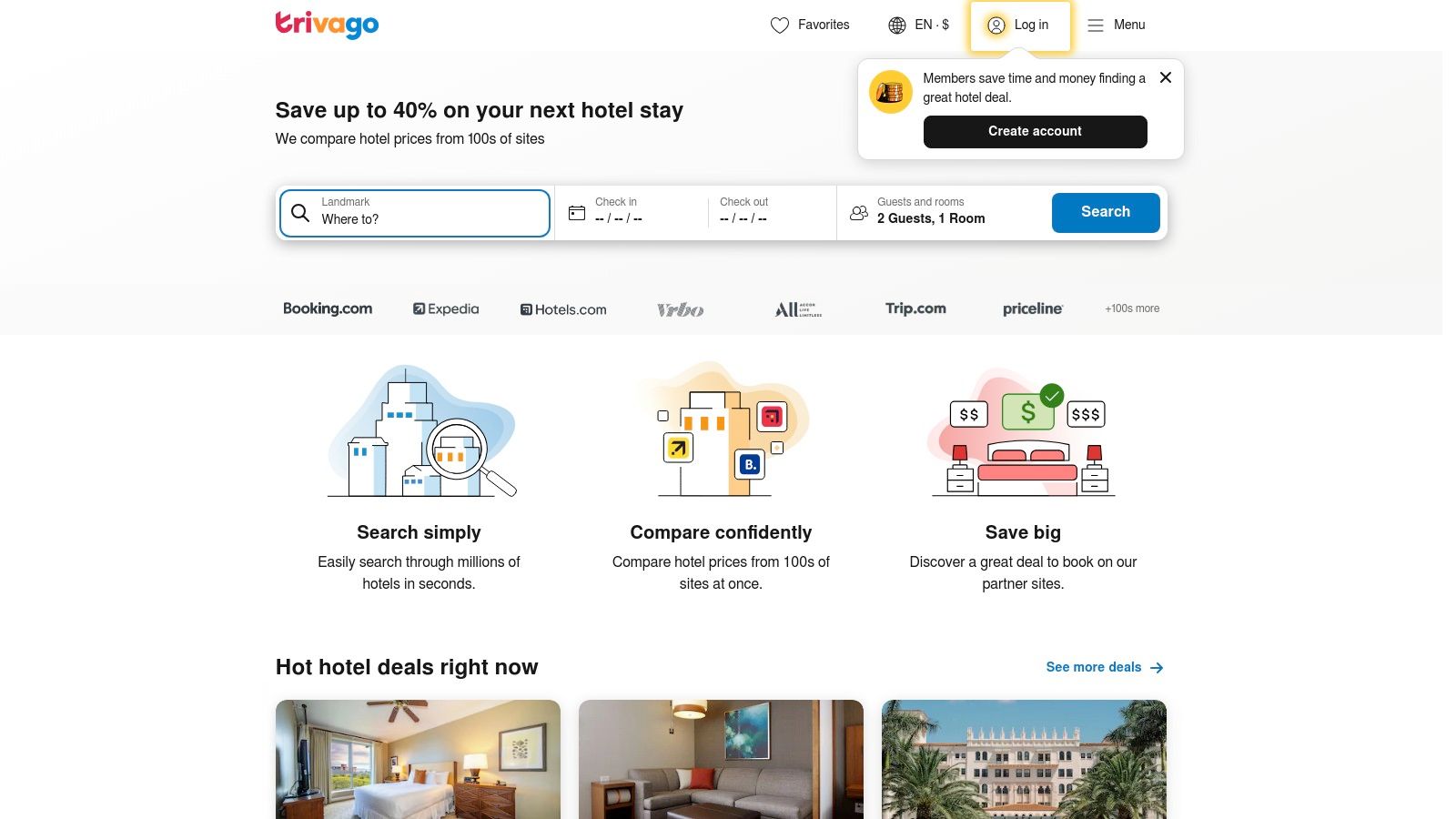
The platform’s strength lies in its aggregated rating system. It synthesizes scores from numerous sources into a single, easy-to-understand index, saving you the hassle of cross-referencing multiple websites. The clean interface and robust filtering options let you narrow down choices by price, rating, distance, and amenities with ease.
Navigating the Platform Effectively
Trivago is best used as a starting point for price comparison and a launchpad for deeper research. Once you find a hotel with a promising aggregated score and price, you can click through to the source sites to read the detailed individual reviews. This two-step process combines Trivago’s price efficiency with the detailed feedback of the original review platforms.
Pro Tip: Always double-check the final price on the booking site Trivago directs you to. Occasionally, prices can differ due to cached data or not including taxes and fees until the final booking step.
Pros and Cons
- Pros:
- Efficient Price Comparison: Quickly compare prices from a vast array of booking sites to find the best deal.
- Aggregated Review Scores: Provides a convenient, at-a-glance rating compiled from multiple sources.
- User-Friendly Interface: The platform is intuitive and easy to navigate with comprehensive filtering capabilities.
- Cons:
- No Original Reviews: You must navigate to third-party sites to read detailed reviews, adding an extra step to the process.
- Potential Price Discrepancies: The displayed price can sometimes differ from the final price on the actual booking site.
Website: https://www.trivago.com
9. Oyster
Oyster differentiates itself by forgoing user-generated content in favor of professional, in-person assessments. Its team of investigators visits hotels anonymously, conducting thorough inspections and taking hundreds of their own photos. This unique “we’ve been there” approach makes it one of the best hotel review sites for travelers who value expert opinion and unfiltered visual evidence over crowd-sourced sentiment.
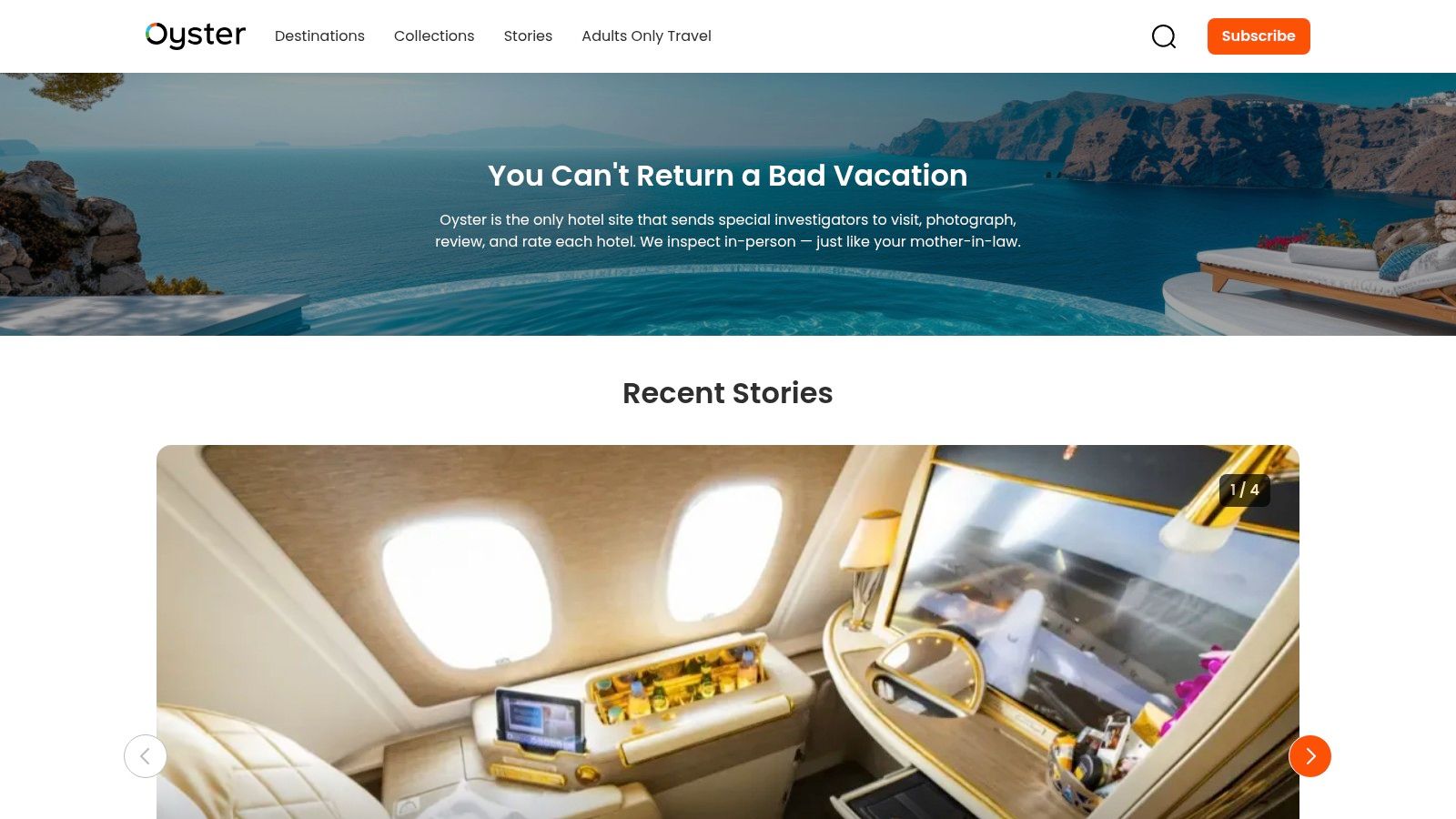
The platform is renowned for its “Photo Fakeouts,” where they compare a hotel’s glossy marketing photos side-by-side with their own candid shots, revealing the often stark reality. Each review includes a detailed breakdown of the location, rooms, features, and an honest “Pros and Cons” summary, giving you a quick yet comprehensive overview. While its coverage isn’t as vast as user-based sites, the quality and credibility of its reviews are exceptional.
Navigating the Platform Effectively
Use Oyster when you have a specific hotel in mind and want a professional, unbiased second opinion. The high-quality, unedited photos are its strongest asset, so spend time browsing the galleries to get a true feel for the property’s condition, size, and atmosphere. The detailed descriptions provide context that photos alone cannot.
Pro Tip: Don’t just read the main review. Oyster often includes deep-dive articles and thematic roundups (e.g., “Best Pools in Vegas”) that can help you discover properties you might not have considered, all vetted by their expert team.
Pros and Cons
- Pros:
- High Credibility: All reviews are written by professional investigators who have physically visited and vetted the property.
- Unbiased Content: Unfiltered, proprietary photos and honest “Pros and Cons” lists provide a transparent look at what to expect.
- Expert Analysis: Offers in-depth, well-written analysis of a hotel’s strengths and weaknesses.
- Cons:
- Limited Coverage: Its professional-only model means it covers far fewer hotels than platforms like Tripadvisor or Google.
- Less Frequent Updates: Reviews may not be as current as those on user-generated sites, as properties must be revisited by staff for an update.
Website: https://www.oyster.com
10. Forbes Travel Guide
For travelers seeking the pinnacle of luxury and service, Forbes Travel Guide stands apart as a definitive authority. Unlike platforms driven by user-generated content, Forbes uses a team of anonymous, professional inspectors who evaluate properties against up to 900 objective standards. This rigorous, expert-led process results in its highly respected Star Rating system, making it one of the best hotel review sites for those prioritizing verified quality over crowd-sourced opinion.
The platform is meticulously curated, focusing exclusively on high-end hotels, restaurants, and spas that meet its demanding criteria. Its reviews are not just summaries of experiences but detailed analyses of service, facilities, and atmosphere, providing a clear picture of what to expect from the world’s most luxurious accommodations.
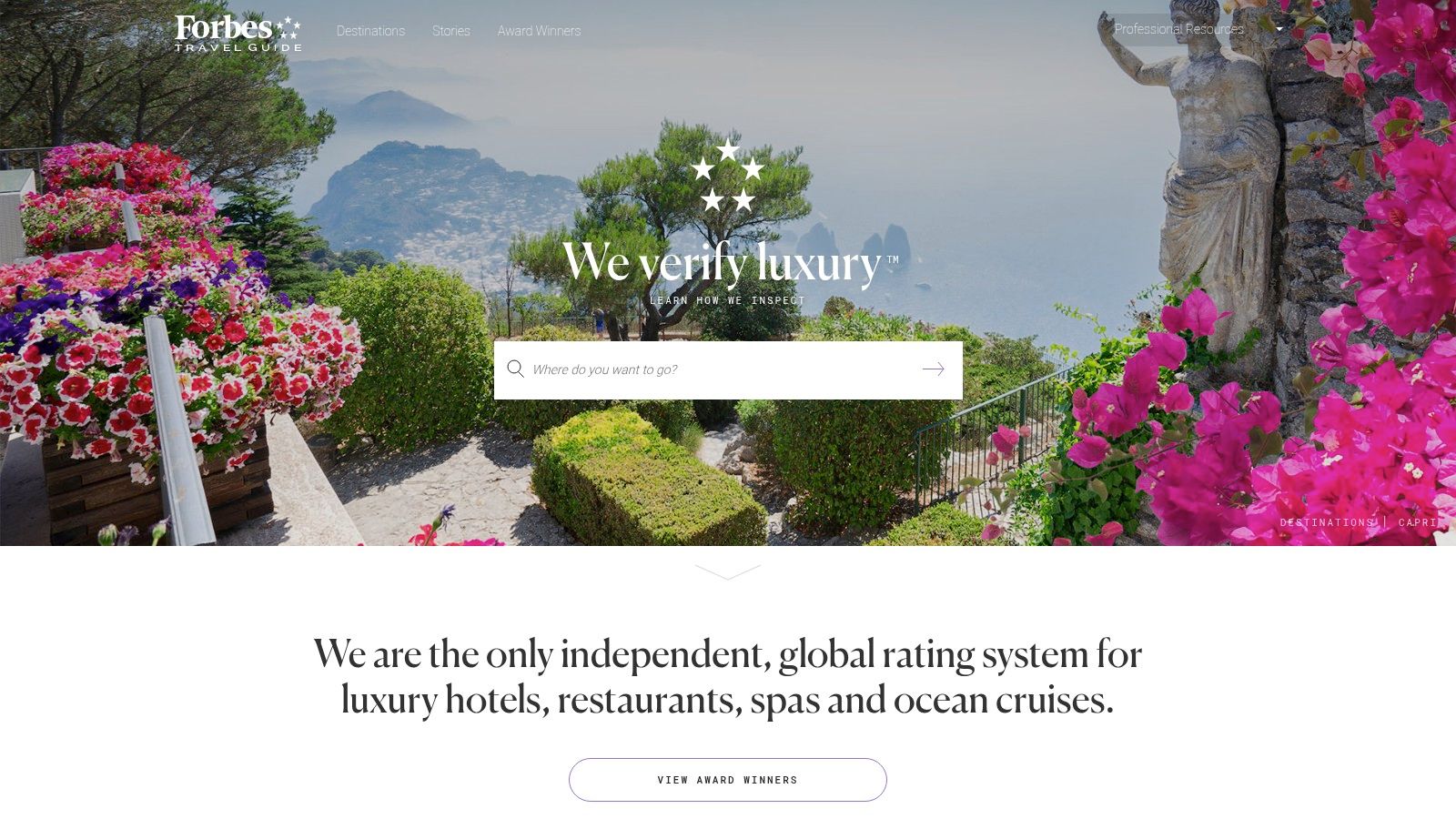
Navigating the Platform Effectively
The primary use for Forbes Travel Guide is aspirational planning and verification for luxury travel. Use the site to discover properties that have earned a Five-Star, Four-Star, or Recommended rating. The detailed inspector highlights provide specific reasons for the rating, pointing out exceptional features or services that you might not find in a standard user review.
Pro Tip: Look at the “Inspector’s Highlights” within each review. These bullet points offer quick insights into a property’s standout features, such as exceptional turn-down service, unique amenities, or outstanding design elements, helping you quickly differentiate between top-tier options.
Pros and Cons
- Pros:
- High Credibility: Ratings are based on objective, professional inspections, eliminating the risk of fake or biased reviews and ensuring a high degree of trust.
- Detailed, Expert Analysis: Reviews offer in-depth insights into service quality and property features from a trained inspector’s perspective.
- Focus on Excellence: Exclusively features properties that meet stringent luxury standards, making it easy to find top-tier options.
- Cons:
- Limited Coverage: Its scope is narrow, focusing only on the luxury market. You will not find budget or mid-range hotels listed here.
- Niche Audience: Best suited for luxury travelers, making it less relevant for those planning budget-friendly or family-oriented trips.
Website: https://www.forbestravelguide.com
11. Andrew Harper’s Hideaway Report
Andrew Harper’s Hideaway Report offers a stark contrast to crowd-sourced platforms, positioning itself as an exclusive, membership-based publisher for the discerning luxury traveler. Its core differentiator is its commitment to anonymity and professional expertise. Instead of user-generated content, all reviews are conducted by anonymous editors who pay their own way, ensuring unbiased and meticulously detailed assessments of high-end hotels and resorts. This makes it one of the best hotel review sites for those prioritizing credibility and expert curation over sheer volume.

Accessing this trove of expert knowledge requires a paid membership, which grants entry to its highly-praised monthly newsletters, detailed regional guidebooks, and exclusive member amenities. The platform is less about finding a deal and more about discovering exceptional, vetted travel experiences that meet a rigorous standard of quality.
Navigating the Platform Effectively
To maximize value, members should engage fully with the ecosystem. Beyond reading individual hotel reviews, explore the curated travel itineraries and regional guides. These resources provide a holistic travel plan built around the same principles of luxury and quality as the hotel inspections. Connecting with their travel advisors can also unlock personalized recommendations and benefits not advertised on the site.
Pro Tip: When using Andrew Harper, trust the “Hideaway Rating.” This proprietary score is based on a hotel’s character, warmth, and sense of place, not just its list of amenities. It’s a reliable indicator of a truly unique and memorable stay.
Pros and Cons
- Pros:
- High Credibility: Anonymous, professional reviews eliminate the risk of fake or biased feedback, providing a trustworthy source of information.
- Exclusive Content & Offers: Members gain access to unique travel insights and special amenities, such as room upgrades and resort credits.
- Focus on Quality: The platform excels at identifying truly exceptional properties that go beyond standard luxury.
- Cons:
- Membership Fee Required: The significant cost of entry makes it inaccessible for budget-conscious travelers.
- Niche Focus: The service is almost exclusively dedicated to the luxury market, offering little for mid-range or budget accommodations.
Website: https://www.andrewharper.com
12. The Good Hotel Guide
The Good Hotel Guide offers a curated, expert-driven alternative to mass-market review platforms. It operates as an annual publication and website focused exclusively on the finest independent hotels in Great Britain and Ireland. Its strength lies in its meticulous curation process, which combines reader recommendations with anonymous, professional inspections, ensuring that only properties with genuine character and high standards are featured. This makes it one of the best hotel review sites for travelers seeking unique, high-quality, and authentic accommodations.
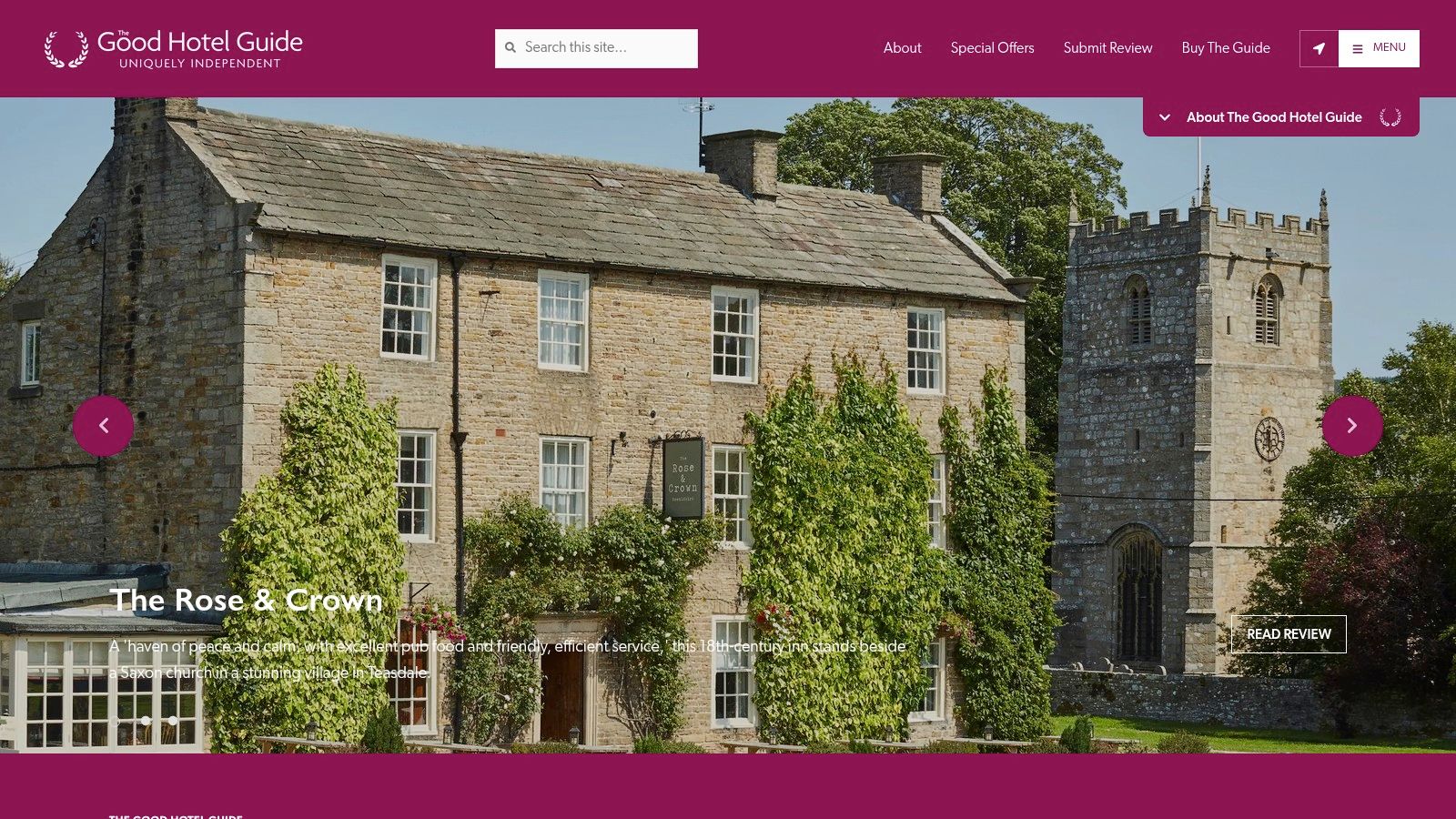
Unlike sites driven by user volume, The Good Hotel Guide prides itself on independence; hotels cannot pay to be included. The platform champions characterful stays, from cozy B&Bs to luxurious country manors, moving beyond the standard chain hotel experience. Its reviews are detailed, well-written, and focus on the ambiance and unique qualities that make a hotel special.
Navigating the Platform Effectively
Use the Guide not just for reviews but for discovery. Explore its themed collections, such as “Dog-friendly hotels,” “Hotels with walking routes,” or “Spa hotels,” to find properties that perfectly match your niche interests. The detailed, narrative-style reviews provide a much deeper sense of a hotel’s personality than a simple star rating.
Pro Tip: While the website is updated, the core recommendations are based on the annual print guide. For the most up-to-date feedback, cross-reference a hotel you find here with a more dynamic review site to check for recent changes in management or service quality.
Pros and Cons
- Pros:
- High Credibility: The combination of reader feedback and anonymous professional inspections creates a highly trustworthy and unbiased selection.
- Focus on Unique Accommodations: Excellent for discovering charming, independent hotels with distinct character that are often missed by larger sites.
- Ad-Free Experience: The website is clean, and hotels cannot pay for their inclusion or a better review, ensuring integrity.
- Cons:
- Limited Geographic Scope: Its coverage is restricted to Great Britain and Ireland, making it unsuitable for international travel planning.
- Annual Publication Cycle: As it’s based on an annual guide, some information may not reflect the absolute latest changes at a property.
Website: https://www.goodhotelguide.com
Top 12 Hotel Review Sites Comparison
| Platform | Core Features / Highlights | User Experience & Quality ★ | Value & Pricing 💰 | Target Audience 👥 | Unique Selling Points / Excellence 🏆 |
|---|---|---|---|---|---|
| Tripadvisor | Billion+ reviews, booking integrations | Diverse, broad perspective ★★★★ | Free, ad-based 💰 | General travelers 👥 | Largest review database ✨ |
| Booking.com | Verified guest reviews, real-time booking | High credibility ★★★★★ | Free to use, commissions 💰 | Serious bookers 👥 | Verified reviews + instant booking ✨ |
| Google Reviews | Integrated with Search & Maps, aggregated reviews | Accessible, instant ★★★★ | Free 💰 | All travelers 👥 | Seamless Google ecosystem integration ✨ |
| Expedia | Verified reviews, flights & car combos | Reliable, bundled travel ★★★★ | Free, package savings 💰 | Package travelers 👥 | Combo deal bundling ✨ |
| Hotels.com | Verified reviews, loyalty program | User-friendly, rewards ★★★★ | Loyalty rewards 💰 | Frequent travelers 👥 | Free nights loyalty program 🏆 |
| Yelp | Community reviews, user photos | Authentic local reviews ★★★ | Free 💰 | Local & North America users 👥 | Strong local business focus ✨ |
| Agoda | Verified reviews, app deals, Asia-Pacific focus | Competitive pricing ★★★★ | Frequent promos 💰 | Asia-Pacific travelers 👥 | App-only exclusive deals ✨ |
| Trivago | Aggregated scores & prices | Easy price comparison ★★★★ | Free 💰 | Price-conscious travelers 👥 | Meta-search with price insights ✨ |
| Oyster | Professional reviews, unfiltered photos | Highly credible ★★★★ | Free 💰 | Quality-focused travelers 👥 | Honest, professional reviews 🏆 |
| Forbes Travel Guide | Star ratings via anonymous inspectors | Luxury-focused, detailed ★★★★★ | Premium reviews 💰 | Luxury travelers 👥 | Professional star ratings for luxury 🏆 |
| Andrew Harper’s Hideaway | Membership, anonymous professional reviews | Exclusive, unbiased ★★★★★ | Membership fee 💰 | Luxury travelers & members 👥 | Exclusive offers & detailed guides 🏆 |
| The Good Hotel Guide | Independent reader + pro reviews | Credible, unique hotel focus ★★★★ | Annual guide purchase 💰 | UK & Ireland travelers 👥 | Characterful hotel selection 🏆 |
Booking Smarter: Your Strategy for Choosing the Perfect Hotel
Navigating the world of online hotel reviews can feel like exploring a vast, new city without a map. With countless opinions, star ratings, and glossy photos, it’s easy to get lost. However, after exploring this comprehensive guide, you are now equipped with a powerful toolkit featuring the best hotel review sites available. The journey from being a passive scroller to a strategic travel researcher is not about finding a single, perfect platform; it’s about mastering the art of synthesis and triangulation.
Your goal is to build a multi-dimensional picture of your potential stay. By layering insights from different types of sources, you create a more reliable and nuanced understanding of what to expect. Think of it as assembling a panel of trusted advisors: some are experts, some are everyday travelers, and others are meticulous fact-checkers.
From Information Overload to Actionable Insight
The key takeaway is that no single site holds the ultimate truth. Each platform serves a distinct purpose in your decision-making process. A smart booking strategy involves a multi-step verification process where you cross-reference information to confirm strengths and identify potential red flags.
Here’s a practical framework to put this into action:
- Start Broad: Begin your search on a high-volume aggregator like Tripadvisor or Google Reviews. These sites provide a massive sample size, giving you an immediate sense of a hotel’s general reputation and highlighting any widespread issues or universally praised features. Focus on the patterns in the reviews, not individual rants or raves.
- Verify with Bookers: Next, pivot to a platform with a “verified stay” system, such as Booking.com or Hotels.com. These reviews are from people who have demonstrably completed a stay booked through the site, which dramatically reduces the likelihood of fake or biased feedback. Use these platforms to validate the themes you identified in your initial broad search.
- Deepen with Professional Eyes: For higher-end or boutique properties, this is the time to consult the experts. Head to Oyster for their “photo fakeouts” and unbiased, in-person assessments. For the pinnacle of luxury, see if the property is rated by the Forbes Travel Guide or recommended by exclusive sources like Andrew Harper’s Hideaway Report. These professional reviews cut through the noise to evaluate service quality, amenities, and overall experience against rigorous, standardized criteria.
Tailoring Your Toolkit to Your Travel Style
The right combination of tools depends entirely on your specific needs. Not every trip requires an exhaustive, multi-platform investigation. Your strategy should be as flexible as your travel plans.
Consider these traveler personas and their ideal research paths:
- The Budget-Conscious Backpacker: Your primary tools will likely be Booking.com for verified reviews on affordable stays and Google Reviews for quick, at-a-glance consensus. The sheer volume of reviews for hostels and budget hotels on these platforms is invaluable.
- The Family Vacation Planner: You’ll want to lean on Tripadvisor’s powerful filters to find family-friendly amenities and read detailed reviews from other parents. Cross-referencing with Expedia’s package deal reviews can also provide insights into the overall resort experience.
- The Luxury Seeker: Your research starts where others might end. After a quick check on Tripadvisor for major red flags, you will spend most of your time on Forbes Travel Guide, Oyster, and perhaps even The Good Hotel Guide to ensure the property meets exacting standards of quality and service.
- The Digital Nomad or Business Traveler: Your needs are specific: reliable Wi-Fi, a good workspace, and a convenient location. Yelp can be surprisingly useful for finding hotels with great co-located cafes, while Booking.com’s detailed filters for business facilities are essential.
By understanding the unique value proposition of each site, you transform the booking process from a gamble into a calculated decision. You are no longer just picking a hotel; you are curating your experience. The power is now firmly in your hands to filter, compare, and confidently select the perfect accommodation that will serve as the backdrop for your next great travel story.
Ready to put your new research skills to the test? At HotelsEscape, we combine curated hotel selections with honest insights, helping you bypass the noise and find properties that truly deliver. We do the initial homework for you, so you can book with confidence. Discover your next perfect getaway at HotelsEscape and start your journey today.

